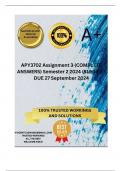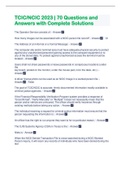,APY3702 Assignment 3 (COMPLETE ANSWERS)
Semester 2 2024 (519063) - DUE 27 September 2024 ; 100%
TRUSTED Complete, trusted solutions and explanations.
QUESTION 1: Lesson 7 The prescribed reading ‘Sustainable
development and environmental health problems in Africa: A
critique’ (2015) “was written by Abiodun Ogunbodede who at
that stage was a student in the Department of
Sociology/Anthropology at the University of Uyo, Nigeria. His
paper is about the impact of multinational companies,
particularly those in the oil (petroleum) industry, on the lives of
the affected communities and what he as an African
anthropologist from a people-orientated African approach
recommends as a possible solution. It is important to note that
researchers might have different solutions to the same problems,
but by reading different opinions we become more informed on
a particular topic, and we grow to become thorough critical
readers and make informed choices about possible solutions.
The main aim of this reading is to focus on the contents – there
is a lot to be learned from his approach, explanations, and
solution. It should be pointed out that through publications,
human issues, and possible solutions are made known to the
world and can assist in the implementation of positive changes
for humanity.” (APY:40) Critically discuss the reasons and
consequences of, as well as possible solutions to
overexploitation and pollution of a community, society, and
nation’s natural environment as identified by Ogunbodede
(2015). (Do not exceed approximately 750 words)
, In the paper “Sustainable Development and Environmental
Health Problems in Africa: A Critique,” Abiodun Ogunbodede
provides a critical analysis of the overexploitation and pollution
resulting from multinational companies' activities, particularly in
the oil industry. This discussion outlines the reasons and
consequences of environmental degradation in affected
communities and societies and explores potential solutions to
these pressing issues.
Reasons for Overexploitation and Pollution
1. Economic Incentives: Multinational companies often
prioritize profit maximization, which leads to the
exploitation of natural resources without adequate regard
for environmental sustainability. Ogunbodede notes that the
drive for economic gain results in activities that disregard
ecological balance, such as excessive drilling and
unregulated waste disposal.
2. Weak Regulatory Frameworks: Many African nations
have inadequate legal and institutional frameworks to
regulate the activities of multinational corporations. This
regulatory weakness stems from a lack of resources,
corruption, and political instability, allowing companies to
operate with minimal oversight. Ogunbodede emphasizes
that the absence of strict environmental laws facilitates
harmful practices that exacerbate environmental
degradation.
3. Global Demand for Resources: The insatiable global
demand for oil and other natural resources creates pressure
on local communities and ecosystems. Ogunbodede
highlights that the desire for foreign investments often





